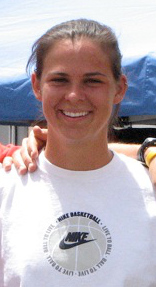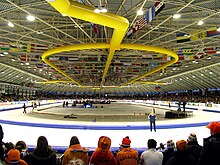
Sven Kramer is a retired Dutch long track speed skater who has won an all time record nine World Allround Championships as well as a record ten European Allround Championships. He is the Olympic champion of the 5000 meters at the Vancouver 2010, Sochi 2014 and Pyeongchang 2018 Olympics, and won a record 21 gold medals at the World Single Distance Championships; eight in the 5000 meters, five in the 10,000 meters, and eight in the team pursuit. Kramer used to be the world record holder in the team pursuit and broke the world records in the 5000 meter and 10,000 meter events three times. By winning the 2010 World Allround Championship, Kramer became the first speed skater in history to win four consecutive world allround championships and eight consecutive international all round championships. He was undefeated in the 18 international allround championships he participated in from the 2006/2007 season until the 2016/2017 season. From November 2007 to March 2009, he was ranked first in the Adelskalender, but despite his dominance as an all-round skater he has since been overtaken on that list by Shani Davis and, more recently, by his teammate Patrick Roest.

The 2010 World Allround Speed Skating Championships were held at the indoor ice rink of the Thialf in Heerenveen, Netherlands on 19, 20 and 21 March 2010.
The 2011–12 ISU Speed Skating World Cup, officially the Essent ISU World Cup Speed Skating 2011–2012, was a series of international speed skating competitions which ran the entire season. The season started on 18 November 2011 in Chelyabinsk, Russia, and ended on 11 March 2012 in Berlin, Germany. In total, seven competition weekends were held at six different locations, twelve cups were contested, and 72 races took place.

The 2012 European Speed Skating Championships was the 37th continental speed skating event for women and the 106th for men, that was held at the City Park Ice Rink in Budapest, Hungary, from 6 to 8 January 2012. The competition was also a qualifying event for the 2012 World Allround Speed Skating Championships as the entry quotas were allocated according to the results of the European Championships.

The 2014 World Allround Speed Skating Championships took place at the indoor ice rink of the Thialf arena in Heerenveen, Netherlands, on 22–23 March 2014.
The 2012–13 ISU Speed Skating World Cup, officially the Essent ISU World Cup Speed Skating 2012–2013, was a series of international speed skating competitions which ran the entire season. The season started on 16 November 2012 in Heerenveen, Netherlands, and ended with the final on 10 March 2013, also in Heerenveen. In total, nine competition weekends were held at eight different locations, twelve cups were contested, and 82 races took place.
The first competition weekend of the 2012–13 ISU Speed Skating World Cup was held in the Thialf arena in Heerenveen, Netherlands, from Friday, 16 November, until Sunday, 18 November 2012.

Denis Igoryevich Yuskov is a former Russian speed skater. He is a three-time gold medalist in men's 1500 meters at the World Single Distance Championships and the World Cup-2016 holder at the distance 1500 m.

Brittany Starr Bowe is an American speed skater and former inline skater and basketball player. She has won eight gold, one silver, and two bronze medals from the world inline speedskating championships. From her junior years, she has another 21 world championship medals. She also has a gold medal from the combined sprint event in roller skating at the 2007 Pan American Games.
The 2013–14 ISU Speed Skating World Cup, officially the Essent ISU World Cup Speed Skating 2013–2014, was a series of international speed skating competitions that ran the entire season. The season started on 8 November 2013 in Calgary, Alberta, Canada, and concluded with the final on 16 March 2014 in Heerenveen, Netherlands. Compared to previous seasons, there were fewer competition weekends; the season was restricted due to the 2014 Winter Olympics, which were arranged in Sochi, Russia, during February 2014. In total, six competition weekends were held at six different locations, twelve cups were contested, and 72 races took place.
The third competition weekend of the 2013–14 ISU Speed Skating World Cup was held in the Alau Ice Palace in Astana, Kazakhstan, from Friday, 29 November, until Sunday, 1 December 2013. It was previously announced to be in Heerenveen, Netherlands.
The 5000 and 10000 meters distances for men in the 2013–14 ISU Speed Skating World Cup was contested over six races on six occasions, out of a total of six World Cup occasions for the season, with the first occasion taking place in Calgary, Alberta, Canada, on 8–10 November 2013, and the final occasion taking place in Heerenveen, Netherlands, on 14–16 March 2014. Five of the races were over 5000 metres, and one race was over 10000 metres.
The 3000 and 5000 meters distances for women in the 2013–14 ISU Speed Skating World Cup was contested over six races on six occasions, out of a total of six World Cup occasions for the season, with the first occasion taking place in Calgary, Alberta, Canada, on 8–10 November 2013, and the final occasion taking place in Heerenveen, Netherlands, on 14–16 March 2014. Five of the races were over 3000 metres, and one race was over 5000 metres.

The 2014 European Speed Skating Championships, officially the Essent ISU European Speed Skating Championships 2014, were held in Hamar, Norway, from 11 to 12 January 2014.
The 2014–15 ISU Speed Skating World Cup, officially the Essent ISU World Cup Speed Skating 2014–2015, was a series of international speed skating competitions that ran the entire season. The season started on 14 November 2014 in Obihiro, Japan, and ended with the final on 22 March 2015 in Erfurt, Germany. In total, seven competition weekends were held at six different locations, twelve cups were contested, and 80 races took place.
The 2015–16 ISU Speed Skating World Cup, officially the ISU World Cup Speed Skating 2015–2016, was a series of international speed skating competitions that ran the entire season. The season started on 13 November 2015 in Calgary, Alberta, Canada, and ended with the final on 13 March 2016 in Heerenveen, Netherlands.

Patrick Roest is a Dutch professional long track speed skater who has won the World Allround Speed Skating Championships three times. He leads the adelskalender, an all-time ranking of skaters' personal bests. He is a member of the commercial team of Team Reggeborgh.







